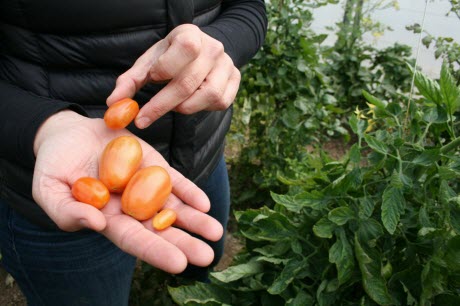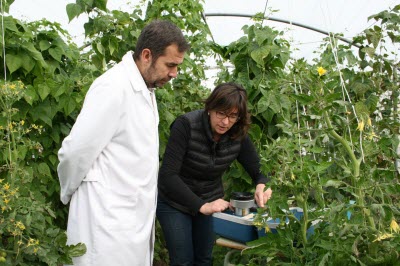Video credit: University of Seville
Experts from the Pharmacy Faculty and the Higher Technical School of Agricultural Engineering (Escuela Técnica Superior de Ingeniería Agronómica - ETSIA) of the University of Seville have published a study that shows that when reducing the water used to water cherry tomato crops by more than 50 percent, the product not only maintains its quality, both commercially and nutritionally, but it also even increases the level of carotenoids, compounds of great interest in the food-processing industry. In addition to being natural colorings, some are vitamin-A precursors, which are beneficial for health and have cosmetic uses.
These findings, published in the important international review Food Chemistry, are the result of a three-year study, during which the researchers analyzed two varieties of cherry tomatoes and other new types of tomatoes, in both autumn and spring cycles in ETSIA's own fields.
 Tomatoes grown using half the water.Photo credit: University of SevilleThe "controlled watering deficit," which is what this technique is called, consists of reducing watering as much as possible during the most resistant phase of cultivation and to increase the supply of water at the start of the phase of cultivation that is most sensitive to stress.
Tomatoes grown using half the water.Photo credit: University of SevilleThe "controlled watering deficit," which is what this technique is called, consists of reducing watering as much as possible during the most resistant phase of cultivation and to increase the supply of water at the start of the phase of cultivation that is most sensitive to stress.
"This is not about using half the water for no reason, but rather studying the water status of the plants and, knowing their needs, watering the crop in the right way and at the best time", explains the Agroforestry Sciences teacher Mireia Corell.
Related Article: Creating Tomatoes That Last Longer and Still Taste Good
This methodology benefits the farmer, opening a new area in the line of water-sustainable products that are differentiated in the market by reduced consumption of both water and energy. And, on the other hand, it brings added value to the consumer who buys a better quality product in terms of nutrition and environmental sustainability.
"Consumers demand healthier food so that they can live longer and better. But it's not only a matter of increasing life expectancy. It's also about making sure that we are healthy in our old age", says Antonio J. Meléndez, a teacher in the Pharmacy Faculty at the University of Seville.
Meléndez leads a European research network called European network to advance carotenoid research and applications in agro-food and health, whose main objective is to advance research and innovation in the area of carotenoids via interaction and cooperation between scientists, technicians, business, and other interested parties. Also, he work closely with the Ibero-American Science and Technology for Development Programme (Programa Iberoamericano de Ciencia y Tecnología para el Desarrollo - CYTED).
 Researchers Antonio j. Meléndez and Mireia Corell.Photo credit: University of SevilleCarotenoids are highly versatile compounds that are very important in areas such as agriculture, food, nutrition, health, and cosmetics, among others. Therefore, the market for these compounds as food ingredients, for both humans and animals, is continually growing. On the other hand, many studies conclude that appropriate carotenoid levels in the diet can play a positive role in protecting against ocular and cardiovascular diseases and different types of cancer, among others.
Researchers Antonio j. Meléndez and Mireia Corell.Photo credit: University of SevilleCarotenoids are highly versatile compounds that are very important in areas such as agriculture, food, nutrition, health, and cosmetics, among others. Therefore, the market for these compounds as food ingredients, for both humans and animals, is continually growing. On the other hand, many studies conclude that appropriate carotenoid levels in the diet can play a positive role in protecting against ocular and cardiovascular diseases and different types of cancer, among others.
These results are the fruit of the doctoral thesis "A study of the contents of carotenoids and the phenolic compounds in tomatoes and flowers in the context of functional diet," by the researcher Elena Coyago Cruz from the Salesian Polytechnic University in Quito (Ecuador), under the direction of Corell and Meléndez. The study also had the help of experts from Miguel Hernández University in Alicante, the Polytechnic of Madrid, the Seville Institute of Natural Resources and Agrobiology (IRNAS) and the Segura Centre of Edaphology and Advanced Biology (CEBAS) in Murcia.
This technique can be extrapolated to other crops like olives and almonds—crops in which this technique is used commercially with good results.












